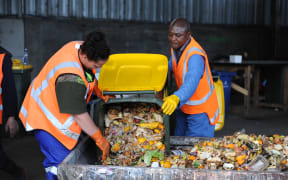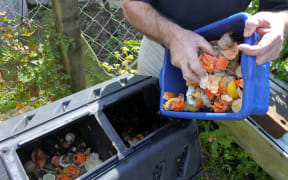It's Christmas time, and despite Kiwi families relying on leftovers to feed them for Boxing Day and beyond, more food goes to waste during the week of 25 December than any other time of the year, according to the Love Food Hate Waste group.
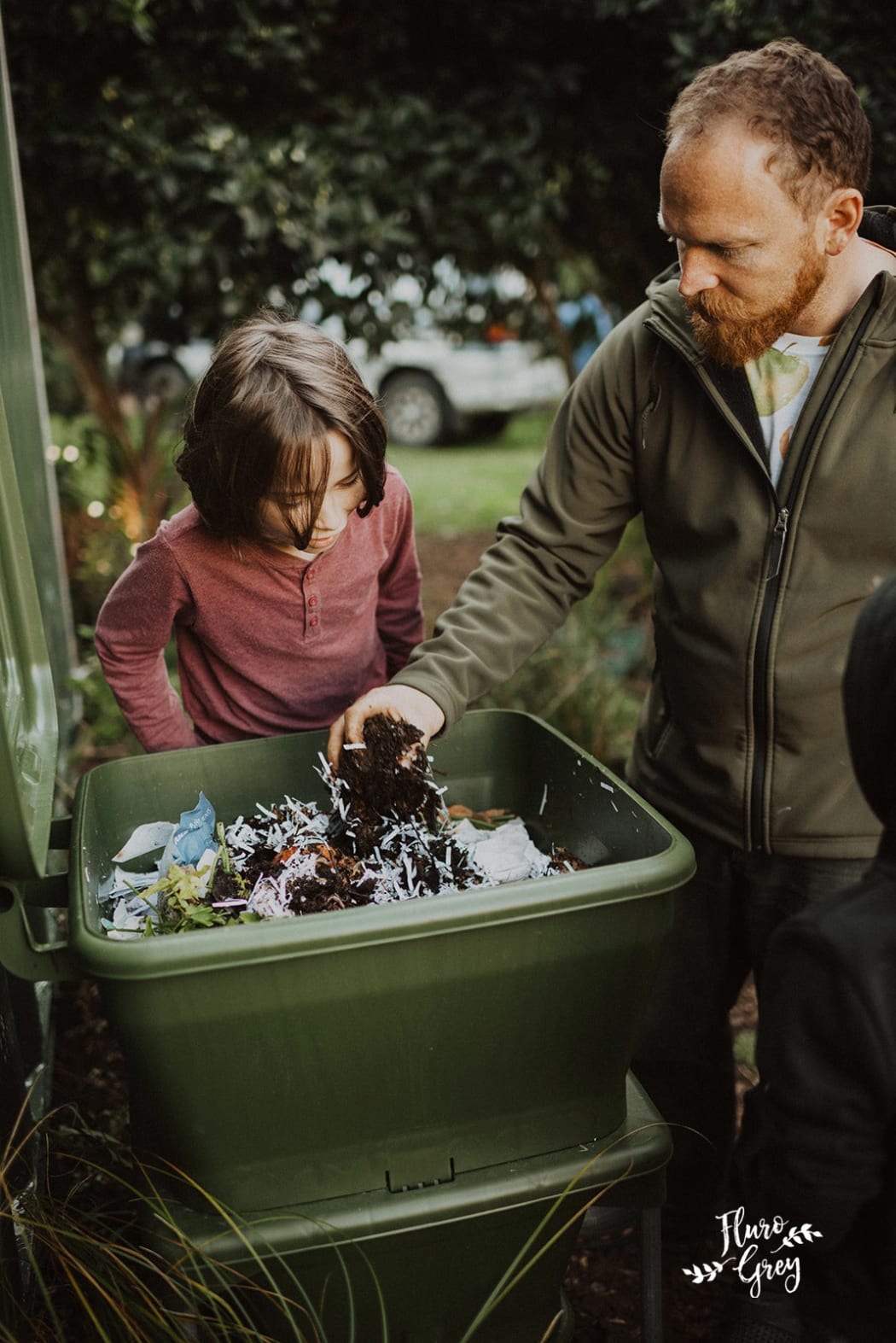
Why Waste founder Leo Murray demonstrating a worm farm. Photo: Supplied / Fluro Grey
The group has campaigned in the past to stop people from overfilling their shopping trolleys during Christmas.
But those who do end up with excess food scraps might turn their mind to worm farms, and the business Why Waste has a novel solution.
It offers worm farm subscriptions - for a $25 per month fee you can have a worm farm on your property that the team at Why Waste will take care of for you.
Josh Storey runs the Auckland arm of the business, where he has about 30 worm farms he services monthly.
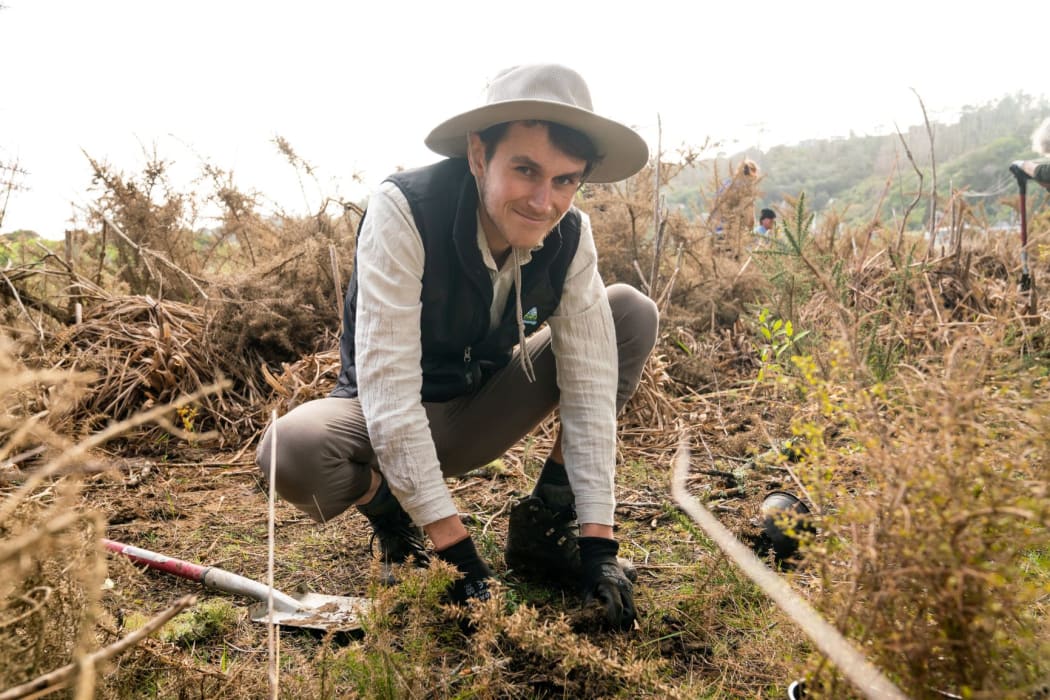
Why Waste Auckland membership ambassador Josh Storey. Photo: Supplied / Geoff Reid
"We check in once a month to make sure it's healthy. Our job is to keep you from smelling it. It just sits next to your bins and you can leave it to us," Storey says.
"They are pretty helpful little systems. They are completely vermin proof - you don't have to worry about rats. When the ecosystem is balanced there is no odour and the worms digest waste into rich soil you can use."
The farms are about the same size as a large wheelie bin, a factor that helps, Storey says - he's even set one up in an apartment carpark.
But it's mainly part of the puzzle of earning a living and doing right by the planet, he says.
"It's about changing to be more resilient. This is just one way of becoming more self-sufficient."
Why Waste founder Leo Murray says the business started off as a broader sustainability consultancy.
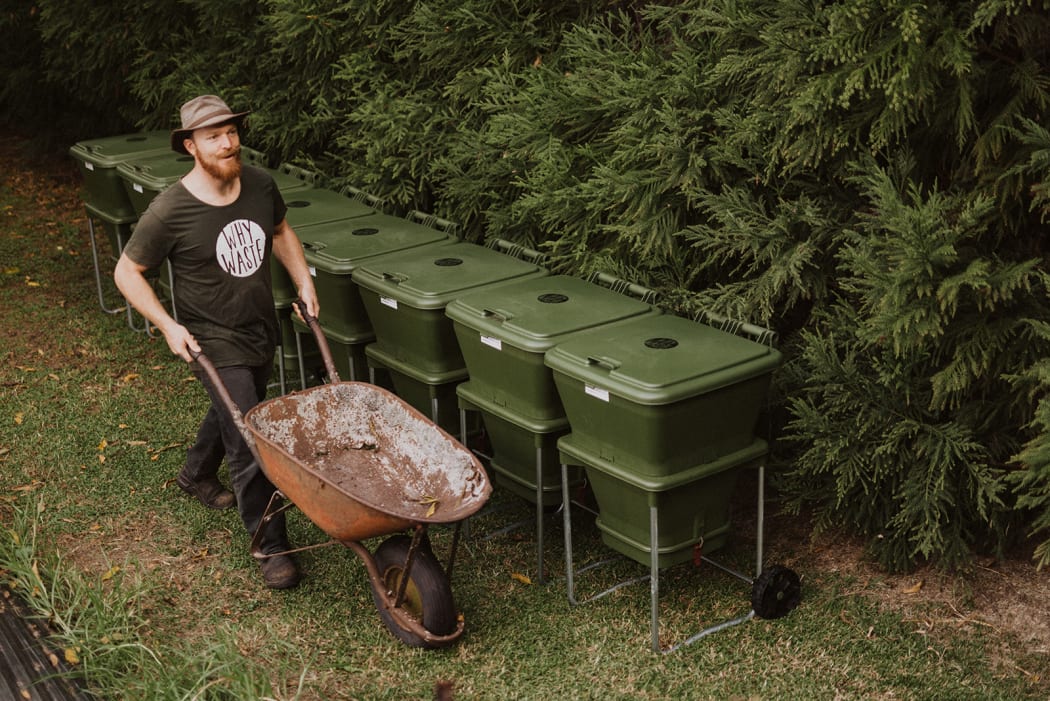
Why Waste founder Leo Murray with some of the worm farms that are available on subscription. Photo: Supplied / FluroGrey
"It just kept emerging that waste was a really big issue... and we were collecting compost from businesses but we still felt we were part of the problem, enabling people to make waste."
Love Food Hate Waste says New Zealand households alone throw away 157,389 tonnes of food a year.
"Now with the worms, by bringing the worms to the place the waste is being created, we are eliminating the need for fossil fuels and … building soil on site.
"There are a few different angles because we have a soil depletion issue and when biodegradable waste goes to landfill it creates methane, which is 30 times worse than carbon dioxide [as a greenhouse gas].
"So we are reducing waste, reducing the amount of greenhouse gases into the atmosphere but also trying to encourage people to grow food or at least nurture more biophilic landscapes … the more healthy the landscape or ecology, the more healthy the humans are when they are in it."
Why subscriptions?
"There's a number of benefits... in the future a lot of products are going to be services because it's all about access to - not ownership over - a certain thing. You're seeing a lot of that with things like the tech sector," Murray - who is keen on a circular economy - says.

Photo: Supplied / FluroGrey
"We're essentially applying that sort of membership model to something that is normally a product - the worm farm - and the benefit to the consumer is that it's guaranteed to work."
If a farm isn't working, the Why Waste team will sort it out or supply a new one, Murray says.
"So you have kind of got this guaranteed worm population and you're minimising the waste you're throwing away so it becomes cost neutral."
The farms can handle up to 2kg of food waste per day, and how much material you have for them depends on what you eat - vegans, for example, would produce more food scraps.
The team have a few "tricks up their sleeve" for keeping the worms happy.
"People who have a job, a career, a family - it's just a lot to expect them to be master worm farmers so it's kind of like having a pool guy or a lawn guy."
Starting out, Why Waste identified city dwellers who were short on time and space as those who might benefit from the worm farm subscription.
"We've got a few surprises along the way ... but what seems to be gaining a lot of momentum is businesses that want to be a bit more responsible or government-associated organisations that might have a sustainability policy or a mandate to reduce waste."
The worm farms are an easy win for them, one that doesn't require much in the way of cost, Murray says.
"The worm farms are pretty dynamic - they can cater for one person right up to a big family and even then some of the larger offices we have on board - the Bay of Plenty Regional Council have 12 worm farms and that manages six floors of a building."
And while the farms do make things easier for those who subscribe, Murray hopes that's not the main factor in people getting them.
But, he says: "To be realistic, we just need to enable people to make the right choice."
Why Waste worm farm subscriptions are mainly available in Auckland, Bay of Plenty, Waikato and Dunedin, but Murray hopes to expand into Wellington in 2021.
The farms cost $25 per month and have a $25 set up fee - both plus GST.
